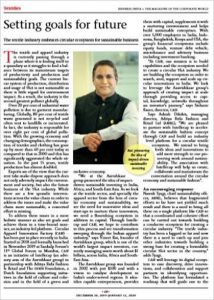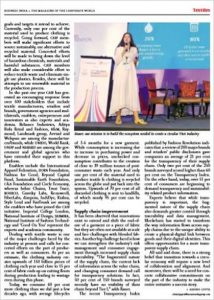Setting goals for future : Business India covers Aavishkaar Group and Intellecap’s pioneering foray in Circular Apparel with CAIF
Out on the stands now*
Arbind Gupta from Business India attended the 11th Sankalp Global Summit 2019 and covered the pioneering foray in Circular Apparel with Intellecap’s Circular Apparel Innovation Factory (CAIF).
The 2 page detailed story in Business India Jan 2020 Issue, now out on the stands, captures a detailed overview on the textile industry with respect to the challenges and the need for sustainable fashion as a practice, capturing the launch of the 1st CAIF conclave, views and opinions from key spokesperson like Group Founder Vineet Rai, Intellecap CAIF Director Stephanie Bauer, Aditya Birla Fashion and Retail’s MD Ashish Dikshit and Chief Sustainability Officer Dr. Naresh Tyagi and the designers present during the summit
 |
 |
The textile and apparel industry is currently passing through a phase where it is finding itself in a quandary as it struggles to find a balance between its mainstream targets of productivity and production and sustainability goals. the current linear system of production, distribution and usage of t&a is not sustainable as there is little regard for environment impact. as a result, the industry is the second-greatest polluter globally.
Over 20 per cent of industrial water pollution is due to garment manufacturing. globally, 80 per cent of textile waste generated is not recycled and often sent to landfills or incinerated. in fact, the industry is responsible for over eight per cent of global pollution. with the growing economy and changing demographics, the consumption of textiles and clothing has gone up by more than 60 per cent today as compared to that in 2000 and this has significantly aggravated the whole situation. in the past 15 years, textile production has almost doubled.
Experts are of the view that the current take-make-dispose approach does not only adversely impact the environment and society, but also the future business of the t&a industry. while there are a few sporadic interventions across the value chain in order to address the issues and make the value chain more sustainable, a concerted effort is missing.
To address these issues in a more holistic manner as also set goals and achieve them in a time-bound manner, an industry-led platform – Circular Apparel Innovation Factory (CAIF) – has been put in place recently in India. started in 2018 and formally launched in November 2019 at Sankalp Forum’s 11th Global Forum in Mumbai, CAIF is an initiative of Intellecap (an advisory arm of the Aavishkaar Group) in partnership with Aditya Birla Fashion & Retail and the Doen foundation, a dutch foundation supporting initiatives in the field of culture and cohesion and in the field of a green and inclusive economy.
“We at the Aavishkaar group pioneered the idea of impact driven sustainable investing in India, Africa, and South-east asia. as we look at the textile sector, and specially the apparel sector from the lens of circular economy and sustainability, we see the need for innovative ideas and start-ups to nurture these innovators, we need a flourishing ecosystem in addition to capital. through Intellecap and CAIF, we hope to contribute to this process and see transformation sweeping through the indian apparel industry,” says Vineet Rai, Founder of Aavishkaar Group, which is one of the world’s largest impact investors, currently managing assets worth about $1 billion, across India, Africa and Southeast Asia.
The Aavishkaar group was founded in 2002 with just $100 and with a vision to catalyse development in India’s under-served regions. it identifies capable entrepreneurs, provides them with capital, supplements it with a nurturing environment and helps build sustainable enterprises. with over 5,000 employees in India, Indonesia, Bangladesh, Kenya and USA, the Group’s financial ecosystems include equity funds, venture debt vehicle, microfinance and advisory business including investment banking.
“At CAIF, our mission is to build capabilities and the ecosystem needed to create a circular t&a industry. we are building the ecosystem in order to search, seed, support and scale up circular innovations in India. we look to leverage the Aavishkaar Group’s approach of creating impact at scale through providing access to capital, knowledge, networks throughout an inventor’s journey,” says Stefanie Bauer, Director, Intellecap CAIF.
Says Ashish Dikshit, Managing Director, Aditya Birla Fashion and Retail ltd (ABFRL), “We are pleased to partner with Intellecap to accelerate the sustainable fashion concept through CAIF and build an industry level platform for a circular textile ecosystem. we intend to bring forth ideas and innovations to add more strength to our pioneering work around sustainability. the association with Intellecap will help us create, collaborate and mainstream the conversation around the circular economy and sustainable fashion“.
Dr. Naresh Tyagi, Chief Sustainability Officer, ABFRL believes that fragmented efforts so far have not yielded much result and there is a need to bring all these on a single platform like CAIF so that a coordinated and cohesive effort can be carried out towards building a conducive ecosystem for creating a circular industry. “The textile industry has been a laggard so far and now there is a need to catch up and join other industries towards building a strong base for creating a formidable circular t&a sector in the country,” adds Tyagi.
CAIF will leverage its digital ecosystem to ease discovery, drive innovations, and collaboration and support partners in identifying opportunities. the platform has formulated a roadmap that will guide one to the goals and targets it intend to achieve.
Currently, only one per cent of the material used to produce clothing is recycled. going forward, caif members will make significant efforts to source sustainably, use alternative and recycled material. concerted efforts will be made to bring down the level of hazardous chemicals, materials and harmful substances. caif members will also make considerable effort to reduce textile waste and eliminate single use plastics. Besides, there will be attempts to use renewable material in the production process.
In the past one year CAIF has generated an encouraging response from over 500 stakeholders that include textile manufacturers, retailers and brands, government agencies and multilaterals, enablers, entrepreneurs and innovators as also experts and academia. reliance industries, aditya Birla retail and fashion, h&m, raymond, landmark group, arvind and welspun are among the manufacturers/brands, while unido, world Bank, undp and nabard are among the government and global agencies who have extended their support to this platform.
Enablers include the international apparel federation, doen foundation, fashion for good, Beyond capital fund, sustainable earth foundation, c&a foundation and circle economy, whereas infini chains, trust trace, boheco, graviky labs, re:newcell, fibrelabs, dimpora, indidye, Kiabza, style lend and fairtrunk are among the enablers who have joined the caif initiative. imperial college london, national institute of design, sasmira, national institute of fashion technology and ‘good on you’ represent the experts and academia community.
Dealing with textile waste is one of the major challenges faced by the industry at present and calls for concerted efforts on the part of producers as well as consumers. as per an estimate, the clothing industry creates upwards of 150 billion pieces of clothing each year and close to 15 per cent of fabric ends up on cutting floors during production leading to wastage even during this phase.
Today, we consume 60 per cent more clothing than we did just a few decades ago, with average lifecycles of 3-6 months for a new garment. while consumption is increasing due to increase in purchasing power and decrease in prices, unchecked consumption contributes to the creation of close to 39 million tonnes of postconsumer waste each year. and only one per cent of the material used to produce textile & clothing is recycled across the globe and put back into the system. upwards of 70 per cent of all discarded clothing is sent to landfills, of which nearly 95 per cent can be recycled.
It has been observed that innovations exist to extend and shift the end-ofuse of a garment or a piece of fabric but they are often not available at scale and face challenges with blended fabrics. another big challenge faced is how we can strengthen the industry’s risk management and consumer engagement through increased supply chain traceability. “The fragmented nature of the supply chain, the current lack of information across the value chain, and changing consumer demand call for transparency solutions. in fact, 50 per cent of 150 brands surveyed recently have no visibility of their chain beyond Tier I ,” adds Bauer.
The recent transparency index published by fashion revolution indicates that a review of 200 major brands and retailers’ public disclosures gave companies an average of 21 per cent for the transparency of their supply chain. only two per cent of the 250 brands surveyed scored higher than 60 per cent on the transparency index. on the other hand, today, over 51 per cent of consumers are beginning to demand transparency and sustainability related product information. experts believe that while transparency is important, the fragmented nature of the supply chain also demands greater control through traceability and data management. Blockchain has started to transform the way information flows across supply chains due to the unique ability to create a physical-digital link between goods and their digital identities. this offers opportunities for a more transparent supply chain. all said and done, there is a strong belief that transition towards a circular economy will require a new level of collaboration and alignment. and moreover, there will be a need for concrete collaborative commitments on the part of the industry to make the entire initiative a success story.
View full article



